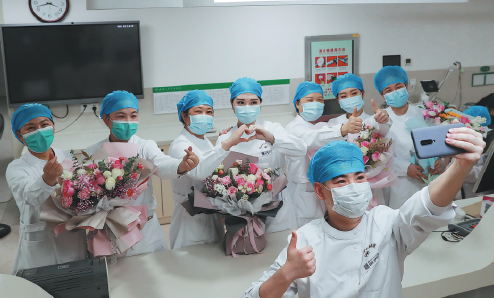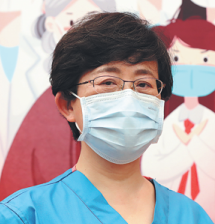How women won the war of the wards
When Wuhan faced its toughest time in the coronavirus battle, female workers answered the call

A shortage of medical supplies. Overstretched hospital facilities. Close contact with contagious patients. Uncertainty about the way novel coronavirus was transmitted.
Qiao Jie, director of a leading hospital in Beijing, was aware of the challenges ahead when she led a team of predominantly female health workers to Wuhan, Hubei province, in early February to treat patients critically ill with novel coronavirus pneumonia.
But the 56-year-old hadn't anticipated one challenge that many female medics and nurses on the front line of the pandemic fight faced-menstruation.
"While on duty, I would often see nurses in sweat-soaked protective gowns bent over because of menstrual pain," said Qiao, an expert in reproductive health at Peking University Third Hospital and a member of the Chinese Academy of Engineering.
The shortage of medical workers meant sick leave was not an option. "They had to fight the urge to use the bathroom to save the single-use, full-body protective gear that was then in short supply."
Front-line nurses lacked sanitary pads, tampons and other items to deal with menstruation as the city was at a standstill due to the virus, according to news reports.
The All-China Women's Federation and an affiliated foundation responded by donating feminine hygiene products for front-line workers in February, when the main focuses of donations were food and medical supplies.
Warrior women
Qiao and her colleagues were among tens of thousands of women who went to Wuhan to battle the virus when very little was known about the pathogen. Official figures show that of 42,600 medical workers from across the nation who went to Wuhan, the Chinese city hit hardest by the virus, two-thirds were women.
Of the 28,600 nurses who came from outside Wuhan, 25,300 were women, according to Wu Xinjuan, director-general of the Chinese Nursing Association.
Wu, head of an aid team deployed to Wuhan by Beijing Union Medical College Hospital, said women were the major force on the front line, demonstrating professional skills and patience in dealing with patients who needed close attention.
Nurses also offered psychological comfort to infected patients isolated from family members, she told a conference in Beijing held by the All-China Women's Federation in the run up to International Nurses Day today.
A shortage of protective gear also forced health workers to perform longer shifts, intubating patients, removing virus-laden sputum and cleaning bedridden patients.
At the beginning of the battle against the virus, the minimum shift for workers was eight hours, Qiao said. Only recently, as the outbreak was brought under control, has the minimum shift been reduced to six hours. For some workers, the shifts are now as short as four hours as the number of patients in critical condition has fallen.
Despite the harsh working conditions, Qiao and her colleagues performed miracles. Of the 405 mostly critically ill patients in the care of Peking University Third Hospital health workers, more than 80 percent recovered.
None of the 406 team members, who were sent to Wuhan from Jan 26, was infected with coronavirus.
Drawing on her expertise in reproductive health, Qiao also drafted protocols on handling pregnant patients and infants during the outbreak. Pregnant women were among those who could not put off hospital visits, despite the risk of infection.
Protocols were already in place for other vulnerable groups such as seniors and children, but there were no guidelines for obstetricians to follow.
The protocols Qiao developed, such as suggesting pregnant patients use medication with fewer side affects on the fetus, were later promoted nationwide in the seventh version of the COVID-19 treatment plans.
Multiple roles
A video clip circulated online showed a tearful husband, Jiang Haojun, seeing off his wife Zhao Yingming, a nurse from a hospital in Guangyuan, Sichuan province, to Wuhan on Jan 28.
As the chartered bus slowly drove away, Jiang shouted that he would do the housework for a year if she made it back safe and sound.
Zhao returned home in March, and was amused to find that Jiang had bought a cleaning robot.
The clip was shared widely and got hundreds of thousands of comments and likes on Weibo.
Though celebrated by many as a "happy ending" for the couple, the clip highlighted the dual burdens Chinese women have to shoulder at home and in the workplace.
According to a report last year by the National Bureau of Statistics, Chinese women on average spend more than two hours a day on housework, compared with just 45 minutes for their male partners. The research found that men work longer hours, seven hours and 52 minutes a day, but that was only 28 minutes more than working women.
Some women were sent to the front line together with their husbands, leaving behind young children in the care of their aging parents.
The situation prompted the Ministry of Civil Affairs, which oversees child and senior welfare services, to release circulars in February asking neighborhood authorities to step up care for vulnerable groups left at home.
The All-China Women's Federation launched a program to deliver food and vegetables to the homes of front-line workers. Stranded at home due to the outbreak, college students in the Guangxi Zhuang autonomous region and Henan province volunteered to tutor the absent parents' children as a way of showing their respect and gratitude.
Yu Yanhong, a member of the National Health Commission Party Leadership Group and Party secretary of the National Administration of Traditional Chinese Medicine, said women demonstrated tremendous courage and altruism in virus-ravaged Wuhan.


Today's Top News
- Nation's euro bond sale shows investors' confidence
- No soft landing for Tokyo's hard line
- Commerce minister urges US to increase areas of cooperation
- Strong demand for China's sovereign bonds signals global confidence
- Ministry urges Japan to 'maintain self-respect'
- Forge closer ties with Zambia, says Li






























